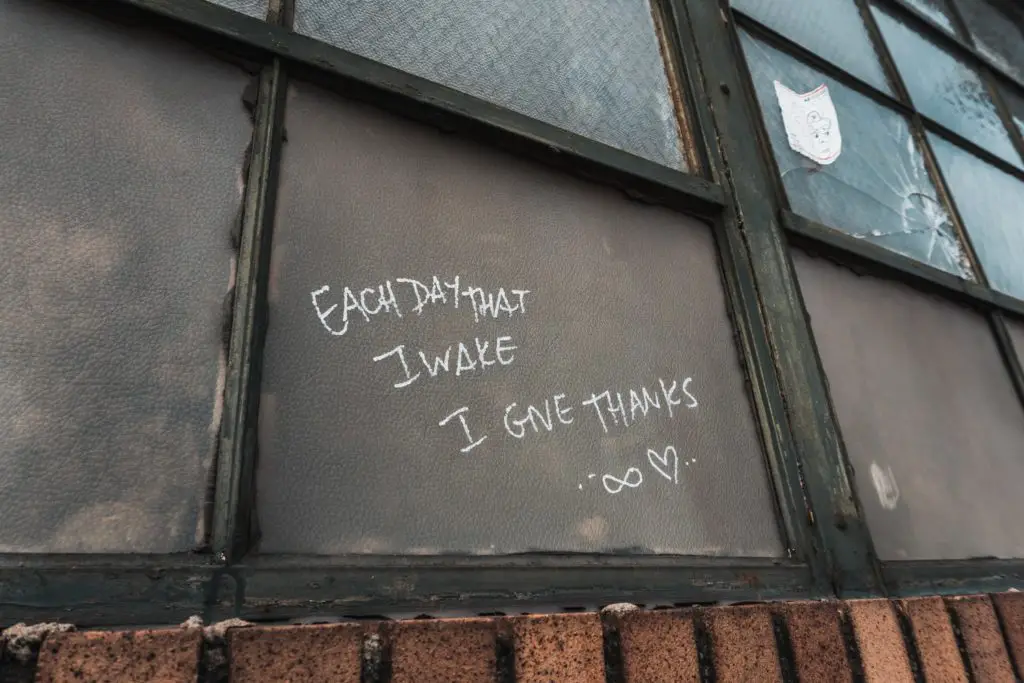Many of us kept diaries as teenagers so we can record our confused thoughts and emotions. The records we kept of our daily experiences were our attempt to understand our place in the world. Sadly, as we “grow up,” we forget how important it is to record those moments, and we set our diary-keeping aside. What we also set aside is our ability to remember things that we’ve done in our day, and reflect upon them.
That reflection of our thoughts and actions is one of the key components to finding fulfillment and happiness in our lives. Of course, the diary recording of our younger selves may be quite different from the older and more mature version of us. But, as adults, diary-keeping can serve an even greater purpose.
The problem is that as we age, we become more skeptical of the events around us. Our minds close-up. We become cynical and mistrustful of the world. As we grow “wiser” to world events, we become less thankful for being alive in what can appear to be such a hard and uncaring world.
But by practicing gratitude we can break through a bit of that cynicism and find some lost happiness. One of the key aspects of cultivating gratitude is to keep a Gratitude Journal, and to use it daily. In this article, I’ll look in-depth at the topic of gratitude, and of gratitude journaling in particular.
Happiness and Hope

A recent study sets out to look at: Gratitude predicts hope and happiness argues that:
- Gratitude is the appreciation of something we perceive as good.
- Happiness is the enjoyment of something good.
- Hope is the desire for a happy future.
The result showed that gratefulness can, indeed, bolster happiness and hope.
Loving Kindness Meditation is a great way to induce happiness and is probably my favorite kind of meditation. Practicing this meditation, in combination with Gratitude Journaling, is a powerful path to happiness. Yale Psychologoy Professor Laurie Santos focuses on both Gratitude and Loving Kindness in her fantastic free course The Science of Happiness.
How Does Gratitude Affect the Heart
Let’s consider a study that looks at gratitude and the heart. A Grateful Heart is a Healthy Heart. The study concentrated on people with heart disease. The results of this study found that patients who naturally felt gratitude in their lives tended to have lighter moods. They slept better and they showed lower indicators of cardiac problems.
Could this mean that a grateful heart is indeed a healthier heart?
What is Gratitude?
Those who notice more of the positive aspects of their lives have a wider outlook on life than people who see everything as negative. They notice and understand more about what is going on around them.

Which sort of person are you? Do you moan a lot about life? Or, do you grasp every experience and ensure something good comes out it?
For example, many of us consider the house we live in to be our safe-haven.
- Now expand your mind beyond this and extend your safe-haven to the town or city you live in.
- Then, even further, to the country that you were born in.
- Don’t stop there, what about the planet you live upon, and the solar system you’re a part of?
- Go even further to the galaxy and, yes, the entire universe.
Suddenly, you’re an integral part of something so much bigger, if only you wake up to that fact. If you can extend your thoughts beyond your tiny bubble of daily life, then you will soon have so much more to feel appreciative for. You might go from being grateful for a roof over your head, to feeling gratitude for living on a world that protects you.
We become more aware of everything, more mindful of the world and our roles in it.
Gratitude is not only about being thankful for gifts on your birthday. It’s more about realizing there are so many more gifts around you than those wrapped in colorful paper and attractive boxes.
A Gratitude Experiment

Write a list of all the things that you are grateful for in your life. Of course, it might begin with your loved ones, but try to think beyond your close family circle.
- How about being grateful for having freshwater supply right into your home? This means you don’t have to walk to a water hole miles away from your home every day of your life.
- Or, take something simpler such as a warm duvet at night on your bed. This means you can have a warm, restful sleep. You’ll wake up the next day refreshed and ready to face many new challenges.
- Ask yourself why you feel grateful for the things in your life. So don’t just think, “I’m grateful for a roof over my head.” Delve deeper and ask why you feel grateful. Allow the emotions to come to the forefront. Such as, “I’m grateful for a roof over my head so I won’t freeze at night time?”
- Imagine if you had to sleep outside! Suddenly that roof over your head is so much more important with this thought in your head. Your home is now a place where you feel safe.
Be more curious about why you are grateful and it will lead to a feeling of relief and true gratitude. It’s about learning to appreciate anything and everything, large and small.
Once you raise your own awareness of all the good things you have access to, you should then share how positive you feel at having so many riches in your life.
Why should you share your feelings of gratitude?
Ever noticed that when you yawn or witness someone else yawning, you tend to copy that action? It’s the same with laughter or a simple smile, we usually like to return such gestures.
There’s a revealing interview with the neuroscientist Marco Iacaboni. In it, he discusses mirror neurons in the brain. He explains why we copy one another as a means of learning empathy.
Our unique ability to feel empathy is how we manage to share our feelings and emotions. Don’t keep your gratitude quiet, shout it out so others can mirror your actions!
Okay, you don’t need to go around literally shouting “thank you” to the world. It’s more about educating others to also feel gratitude.
How can you share your gratitude so others will mirror it?
Start with simple things:
- Try to keep your eyes off your phone while you’re in public. Don’t descend into your own little world, neck craned down and body language saying “stop”. Instead, put the phone away, look up, and strike up casual conversation with those around you.
- Make eye contact and smile at the waiting staff when they take your next order in a restaurant. Even if they don’t return your smile, you’re showing other people that you appreciate what they are doing for you. This can go a long way to make someone you don’t know feel good.
- Compliment people for something you see as positive. Like a work colleague who helps you, or a child who does something clever. Even better, how about a stranger? When people feel rewarded they are more likely to show you warmth towards others and mirror your kindness.
- If you think someone is wrong in what they are talking about, resist that urge to tell them outright that they are wrong. Instead, encourage them to talk more so you can understand their position. Listen intently before you respond. They will appreciate your listening skills and be more ready to accept your response.
- Offer to make coffee for other people at work more often. Even if you are the boss.
It’s all about finding small ways of showing your appreciation about those around you and what they do. Such behavior may then be mirrored by others. Okay, not everyone. Though, if only one person can see how content you are with your life, they too may wish to be like you.
How then, can we go about practicing this philosophy so that we can reach out for happiness and hope?
Gratitude Journaling

What’s going on inside your head is the real you. This is where all your mental balancing is trying to work all this stuff out. Your brain is very busy as it attempts to put everything in order so you can function. The trouble is, your brain doesn’t always get it right when left to its own devices. That’s why you need to focus. You need to be aware of what’s happening around you.
Do this by writing down your daily reactions to life. Set time aside to focus on the stuff that’s whirring around in your head. It’s not selfish to take some time to yourself, especially when there is a real purpose to it. The ultimate aim is to help you improve your own well-being. This will help you to achieve a comfortable and happy place in this world. Only then can you help others to do the same.
Get into the habit of writing a daily gratitude journal. This isn’t a typical diary, and you’re not looking to log your every thought or movement of the day. This is going to be more of a journal of your “gratitude” towards life itself.
That’s because we tend to brush aside our daily thoughts very easily. Unless they’re negative, of course. Then we seem to dwell on them!
For instance, if someone gives you a compliment, such as, “Hey, that’s a nice coat you’re wearing,” you may smile and thank them. Most likely you’ll soon forget all about it. In contrast, if someone said, “Hey, you’re coat stinks!” then you’ll begin to worry about your appearance. It’s not a comment you will forget because it’s caused you to worry. This shows how we tend to remember the negatives and not the positives.
What you write in your Gratitude Journal should be more about positive emotions you feel and not the negative ones.
You’ll need to dig deeper than simple writing techniques. Here’s a couple of examples to think about.
Example 1
“I got on the subway and we were packed in like sardines. At least I got a seat.”
Instead, write something like –
“I got on a packed subway and everyone looked miserable. I found an empty seat but I gave it to up to an older guy who looked tired. It made me feel good because he smiled back at me. So I smiled at the woman who was standing next to me and she smiled back too. Then I commented to her that I hoped the sun was shining when we got out of this dark place. She told me that she’d brought her umbrella, just in case, and we laughed at our typically bad weather.”
This is only a scenario, but it shows how one good deed can build the foundation for further good deeds and whole-scale happiness improvement. You spoke to someone you’d wouldn’t normally have even noticed. You smiled more and you made others smile too.
Another thing to note is that if you hadn’t jotted this situation down when you got into the office or got home, you would soon have forgotten all about it. By keeping a journal for such events, you can reflect upon it later to show you how rich your life really is.
It’s not about the actual exercise of writing, it’s more about forcing you to think and feel.
Example 2
“I’m grateful for my loving partner.”
Instead, ask yourself why?
“I’m grateful for my long partner because she/he likes to do things for me.”
Because is a powerful word. Sometimes you don’t even know the because when you start to write it, but it makes you think, and makes you work to identify the reasons for your feelings.
Once you’ve written a reason, it might start you wondering. Such as, what was the last thing your partner did for you? What other things do you remember them doing for you? The thoughts should stir emotions inside of you. Those emotions will help you to feel real gratitude. There is a reasoning behind why you are grateful for.
This philosophy is how you need to approach keeping a gratitude diary.
- What was the situation?
- Why did you feel grateful?
- What emotions are stirred in your mind?
If it doesn’t, then dig deeper. Your Gratitude Journalling shouldn’t be full of repetitive thanks. It’s the reasoning behind why you feel grateful that counts the most.
One thought should lead to another and create a thread of thinking. Feel what you are thinking about and allow the emotions to flow onto your journal.
If you find it difficult to think about what to write, then have a daily set pattern. Choose 2-3 questions a day, such as from these sample ideas:
Gratitude Journal Inspiration

- A quality you admire in a person you know.
- A quality you admire in something you did today.
- One thing that you are looking forward to tomorrow, and why?
- A quality in the weather that made you feel good (i.e. the rain because the farmers need it for their crops. Or, the sun because the heat on my face felt good.)
- One quality within yourself, ie I’m grateful I have two legs and can walk and run as far as I like. I can’t imagine how it must feel if I couldn’t.
- One good thing about my job is… because…
- One good thing about my finances (i.e. I can afford to eat, imagine if I couldn’t)
- One good thing in my childhood was…because…
- What scents did I smell today and enjoy?
- What food did I eat today and enjoy?
- What do I like about the city I live in?
When you get up in the morning, write down what you think will be the best part of your day. Then, later that night, think about that experience and see if it was as good as you’d hoped it would be. If it was, then you might find yourself smiling as you write about it. If it wasn’t, then ask yourself why.
Could you have done something different to make it better? The idea is to force you to think about the experiences of your day instead of simply forgetting them the minute the day is ended.
The above ideas are meant to make you think and feel. Once you get started, think up your own questions. Find different answers when you find yourself repeating the same questions.
Here’s a great journal that could help you get started. It coaxes you to feel your Gratitude on a daily basis, and all you have to do is use words that evoke emotions.
The Five Minute Journal

The Five Minute Journal is designed with the use of leading psychological research. It provides for you with a structured format to help you focus on YOU. It has a morning and an evening section, to make sure you cover your whole day. It helps you to focus your attention on the positive parts of your day.
With one page per day for around 7-months, that’s plenty of time to improve your mental wellbeing.
While this is not one the least expensive Gratitude Journals, it is an excellent design. It gives you an idea of what you need to be thinking about in your Journalling journey.
There’s even a motivational quote for each day. These should help you to feel positive at the start of your day. The evening section helps you to reflect. It also encourages you to think about what you’re looking forward to tomorrow.
The best thing is with this design, your daily journaling will take only 5-minutes of your time. Of course, you don’t need this do Gratitude Journal. Any paper will do. But having a nice package with pre-set inspiration can really help turn your journaling process into a habit, a positive ritual.
Last update on 2024-04-04 / Affiliate links / Images from Amazon Product Advertising API
Conclusion
5 minutes spent Gratitude Journaling could become 5 of the most important minutes of your day. There’s no doubt that Gratitude Journaling can be a very powerful tool for positive mental health and improving happiness.
With a physical hard copy journal, you are encouraged to put pen to paper and write. Not tap the words on a keyboard or on a screen, but actually write them down, bad penmanship and all.
As you write, you think. As you think, you feel. That’s the idea, and it works.
There are plenty of successful electronic journals so you can choose whatever’s better for you. But using pen and paper brings you into the present, and is more meditative.
Writing a daily Gratitude Journal isn’t about forward-planning or keeping a diary. It’s about bringing out the positive thoughts in your mind and writing them down. It’s about cultivating your own positivity to life’s experiences. Realizing that you are, indeed, wealthy beyond financial sources. Try and find gratitude for every experience you feel. Experiences that you would normally be forgotten if you hadn’t logged them in your Gratitude Journal.
Improve your happiness by simply feeling more grateful for the everyday things that happen around you. Show your appreciation to those who live your life with you. Spread kindness and compassion wherever your footsteps happen to take you.






